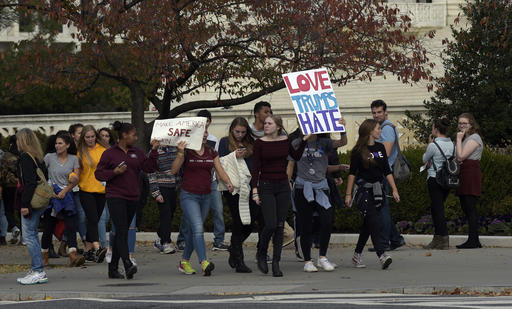Faculty Column: Young people can effect change
Faculty column examines post-Election America – a reaction and rebuttal to “Winners Win”

Washington area high school students protest near the Supreme Court in Washington, Tuesday, Nov. 15, 2016. Hundreds of demonstrators are gathered outside the Supreme Court to protest Donald Trump’s election. They are mostly young people who appear to have walked out of school to protest. (AP Photo/Susan Walsh)
The kind of hate mongering we see promoted by our president-elect during his campaign is NOT on par with tired old accusations of political corruption that have droned on for decades while the sky never fell.
A minority of the population – but a significant one – voted this election in order to lash out with hatred, to intimidate, and to undo social progress.
If we are present and observant citizens, we are aware that confederate flags now fly down middle class suburban streets newly unafraid of censure, we see the President-elect’s name integrated with a swastika and emblazoned on a wall in Philadelphia, and we see in response Times Square packed as on New Year’s Eve with protesters. We needn’t have much imagination to understand that this election has already had and will continue to have a uniquely traumatizing effect on many.
This election was much more than routine and mainstream party politics. People are not marching in the streets because they are offended by “vulgar language and bad jokes.” They are marching because they feel their civil liberties and their very safety may be at risk. Whether or not those wishing fellow Americans harm will actually be empowered or even tolerated by Mr. Trump and his staff, the fact remains that these people feel empowered and enabled by a President-elect who has said far too little to discourage them.
Do we teach our children that such fears are imaginings? In Germany in the thirties, many well-meaning Jewish and Catholic parents, both working class and intellectual, reassured their children in this manner; history teaches us the consequences of defaulting to the assumption that all will be ok if we just look after ourselves, that hate and the kind of nationalism that leads to despotism will dissipate with time. History teaches us that we need to be vigilant. If we are to teach our children well, this is what we must imbue them with.
We agree with Mr. Gillespie’s assertion that those who are the privileged, those who make more than an average salary, have never felt hunger, have never lived as a target of hate, may find it easy to invalidate the suffering of those who have experienced these things or fear experiencing them for the first time, perceive them as whiners and not winners. Shall we teach our children this? Isn’t the message also asserting that Hillary Clinton lost because she didn’t try hard enough? That isn’t accurate either, but to state boldly that the fact is, winners win, is to tell our students and our children that the woman in the race just didn’t work hard enough.
It’s one thing to teach young people that political strife and a schism in the national character shouldn’t derail their striving, that such circumstance should instead move them to redouble their efforts. It’s another thing to imply that such a state of national affairs causes only losers pain, that our children should look out for number one, and all will be well. All is well for the fortunate, but for how long? What happened to teaching our children to stand up and speak out for what is right? We have only a few points of access to our own voice – one is our vote, and it disheartens me to hear any civics teacher encourage a non-vote. Another is peaceful civil protest, which Mr. McCreary implies is the behavior of losers.
Kennedy implored us to ask what we could do for our country, not ourselves. We don’t know if the nation ever wholly embraced that maxim, but the human rights / anti-war youth movement of the late 60s stand as evidence that young people can effect change. The social progress we have seen since is attributable to these kind of “winners.”

